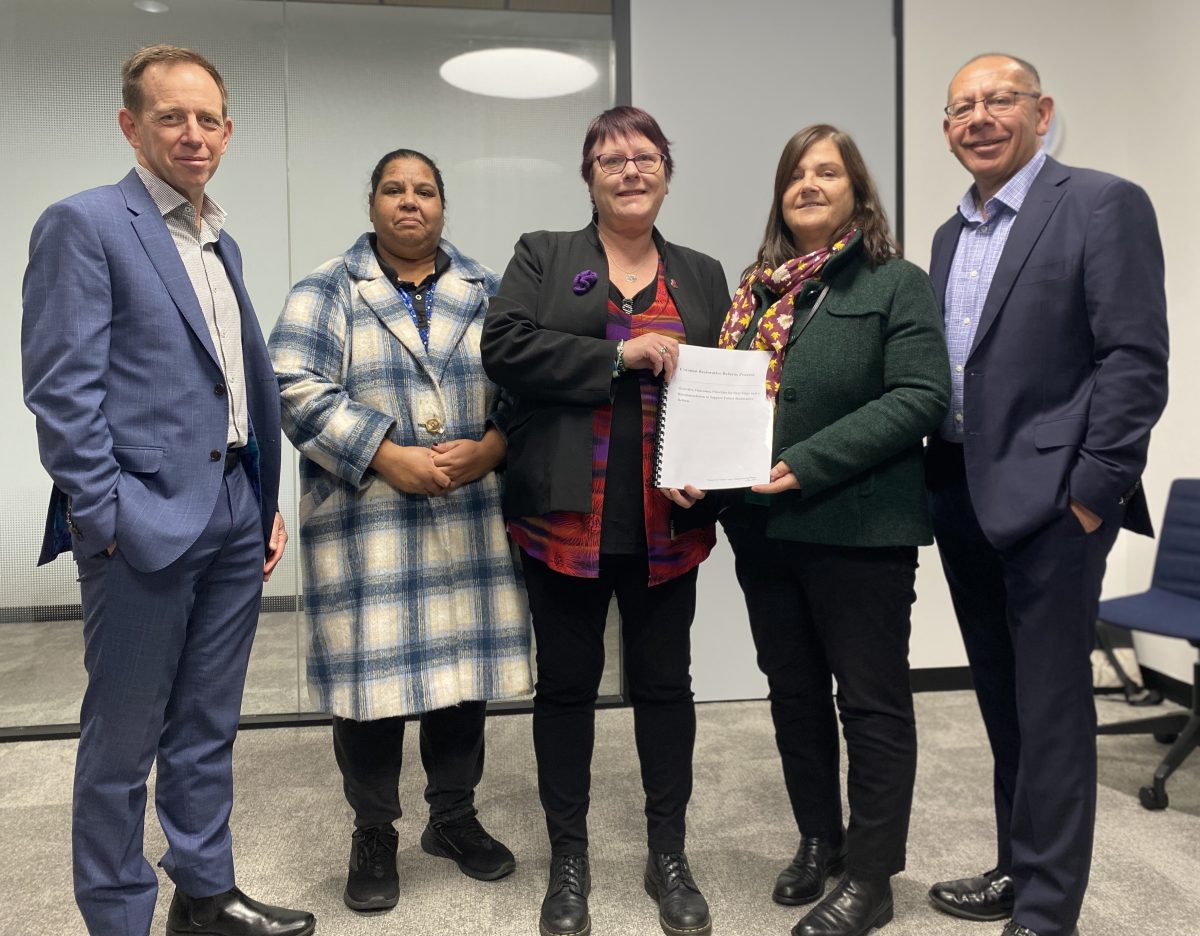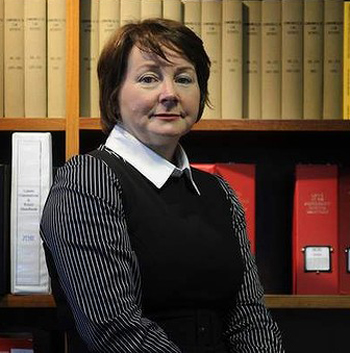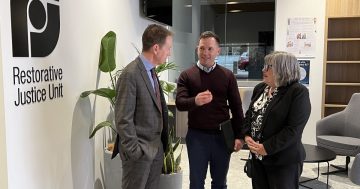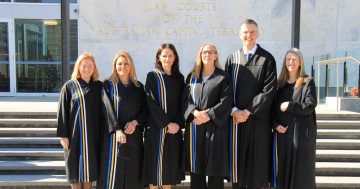
The Coronial Restorative Reform Process report by independent facilitator Alistair Legge (right) has been welcomed by Attorney-General Shane Rattenbury and coronial advocates Deanne Booth, Janine Haskins and Ann Finlay. Photo: Claire Fenwicke.
An independent review has outlined a number of reforms ACT coroners could adopt so families aren’t “re-traumatised, stigmatised, dismissed and side-lined” during coronial inquests.
However, questions have been raised about the court’s willingness to actually take part, given the absence of the Chief Coroner (who is also the Chief Magistrate) during the review’s consultations.
Consultant Alistair Legge was engaged as an independent facilitator to conduct the 12-month investigation (which ended up being 18 months) into how to make the ACT’s coronial process more restorative.
Mr Legge’s report found that while most of the technical aspects of the court were working and that there were plenty of people committed to ensuring families were supported in the process, there was still a critical aspect missing.
“I think my conclusion is that the human side often doesn’t [work], or at least it doesn’t work consistently or as well as it should,” he said.
“Instead of aiding in the closure and healing of the pain and trauma of loved ones and families, the process continues to traumatise people.”
The Coronial Restorative Reform Process – upon which the independent report was prepared – had intended to build a “collaborative and inclusive restorative process” that brought all stakeholders together to explore reform for the Coroner’s Court.
It was only able to achieve one joint meeting of the dedicated coroner, Ken Archer, court staff, police and advocates in June 2023. The Chief Magistrate did not attend.
“Frustratingly, it wasn’t able to do as it was intended, but it did, however, do some good and important things, and those are detailed in the report,” Mr Legge said.
When questioned further by Region over what exactly had frustrated the process, Mr Legge said the courts as an institution “were not supportive of ongoing engagement”, particularly with the coronial advocates who had lived experience of dealing with the court.
“I think it is reasonable to say the Chief Magistrate was not supportive of that part of the process. The question for me was, and remains, why not? I don’t have an answer for that,” he said.
“The June meeting was significant as it allowed barriers to be broken down, information shared and understanding gained. I saw it as a great starting point. Unfortunately, things stalled after that.”
The ACT is the only jurisdiction where the role of Chief Magistrate and Chief Coroner is held by the same judicial officer – a position currently held by Lorraine Walker.
An appendix to the report, penned by members of the ACT Coronial Advocacy Group (ACAG), was critical of her level of engagement, noting she had originally agreed to attend the June meeting after it had been delayed for two months to allow her presence.
“On the day of the meeting, we were advised by [Mr Legge] that she had chosen not to attend,” the group wrote.
“[She] did not accept our subsequent invitations … to discuss ways of getting the process back on track.
“This was a very frustrating and disappointing experience that mirrored and amplified the experience that many families endure during coronial processes … [w]e felt, as all too often coronial families do, that we were being disregarded, dismissed, ignored and disrespected.”

Justice Lorraine Walker is both the ACT’s Chief Magistrate and Chief Coroner. Photo: File.
Region approached Chief Magistrate Walker about the statements made about her engagement.
She said she did not attend the June meeting as there was already a “large contingent” attending from court and it was to be a long meeting.
“The Court was more than amply represented by a coroner, the Coroners Court Registrar and court legal and administrative representatives,” Chief Magistrate Walker said.
“I was fully appraised of the discussions which took place. I am well across the areas of concern.”
She noted areas where she had already demonstrated her “clear commitment” to restorative processes, including first raising the issue in the Law Reform Advisory Council, engagement with various coronial reform groups, and her personal advocacy for more resources to be allocated to the court specifically for coronial work.
“Independent of the review process, the Court has been engaged in significant reform over the last five or six years,” Chief Magistrate Walker said.
“The Court has confirmed (see my letter annexed to the report) that if the government established a coronial advisory body, the Court would welcome engagement with such a group insofar as that remains consistent with the separation of powers and independence of the court.”
One key recommendation in Mr Legge’s report was an independent review to determine whether this model was in the best interest of a “timely and effective” coronial process.
ACAG member Janine Haskins said this would be critical to get the rest of the recommendations off the ground.
“We’ve been able to make some tangible recommendations that don’t need legislative change, but we need a statutory-protected coroner because, at the moment, our dedicated coroner, Ken Archer, can be pulled off to the magistrates bench at any time,” she said.
“Too many families feel re-traumatised, stigmatised, dismissed and side-lined throughout the coronial process.
“We can’t get our loved ones back, but our objective is to save lives in the future.”
Two other key recommendations were for the Attorney-General to establish an interim joint committee or working group for stakeholders to continue engagement and provide advice for ongoing coronial reform (until a permanent body can be set up) and for eligibility of Victim Support ACT services to be expanded to all persons where the death of a family member is subject to the coronial process.
Mr Rattenbury said he was willing to start implementing what changes he could but noted the upcoming caretaker period ahead of the October election meant legislative change wouldn’t be possible until the next term of government.
“We need to think about the things we can trigger quickly and the things that will take a little bit longer,” he said.
“We will continue on to the next stage in our journey now and make sure we get to a place where we produce a coronial system that is the one we want it to be.”















